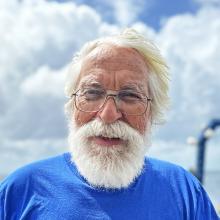
Patrick Colin
Tell us about your work/research. What kinds of things do you do?
I work on a wide diversity of tropical marine science topics, from physical studies (temperature, currents, waves) to ecology of fishes. On the E/V Nautilus expedition I am interested in observing distribution of invertebrates and fishes and the geology/sediment dynamics along the outer slopes of Palau in a variety of areas from the 100-200 m depth range to about 1,000 m depth. This work builds on a 30 year effort aimed at bathymetry, monitoring the physical environment, habitat distribution and diversity and species specific habitat/behavioral observations.
What sparked your initial interest in your career?
I became interested in fishes at a young age, and went to grad school at Univ. of Miami for MS and PhD. Worked extensively in Florida, Bahamas and the West Indies, then moved to the Indo-Pacific, living in the Marshall Islands and Papua New Guinea. As CRRRF (Coral Reef Research Foundation) we worked for 22 years as contract collectors for the US National Cancer Institute searching worldwide for new cancer treatment drugs from marine organisms. During this time we started a research laboratory in Palau (1995) and continue a wide variety of work here today.
Who influenced you or encouraged you the most?
People within the tropical fish, public aquarium and marine aquarium industry.
What element of your work/study do you think is the most fascinating?
In a place like Palau after 30 years of doing ocean discovery and basic research, we still continue to find new things, habitats, and species and to document them. Ocean exploration has been my driving interest for over 50 years.
How did you get involved with the Ocean Exploration Trust?
Asked to join expedition due to our long tenure of doing ocean exploration within Palau and the opportunity to examine new areas along the reef/island slopes at depths below those accessible with diving and basic ROV equipment.
What other jobs led you to your current career?
The importance of either living at or spending long periods (months-years) working i specific areas so the variation of ocean conditions can be seen and recorded, as well as thoroughly learning what organisms occur in these areas. I have always worked at locations where field stations or marine labs provided such access, and engaged in travel to other areas for intensive field work.
What are your degrees and certifications?
M.S. (1970), PhD (1973) - RSMAS University of Miami
What are your hobbies?
Building things (airplanes, diving rebreathers, camera housings, underwater equipment) and fixing things. Flying, photography, boats, anything marine related.
What advice would you give someone who wants to have a career like yours?
Learn basic science within your fields of interest, find a specialty which is satisfying to you, engage in field work whenever possible, travel widely to locations related to your fields of interest, be a naturalist, as well as a scientist. Know your creatures.
Expeditions
Patrick participated in the following Ocean Exploration Trust expeditions:
